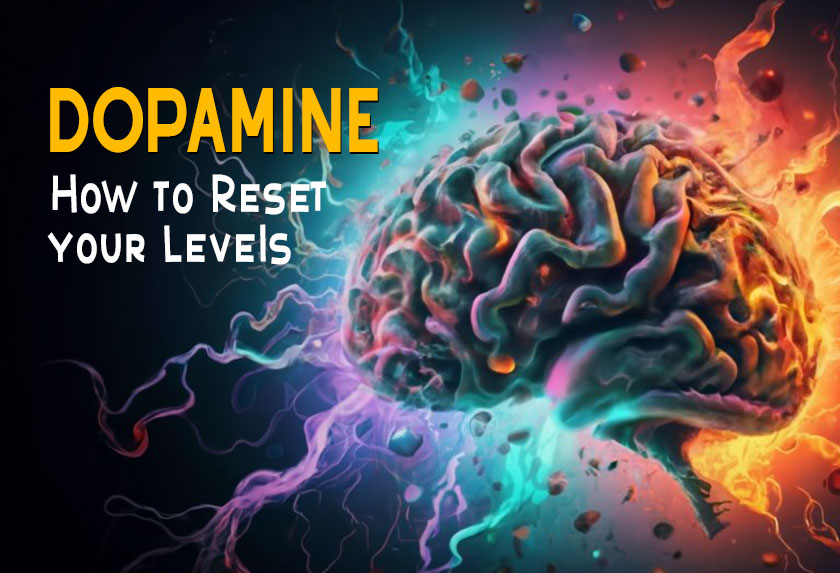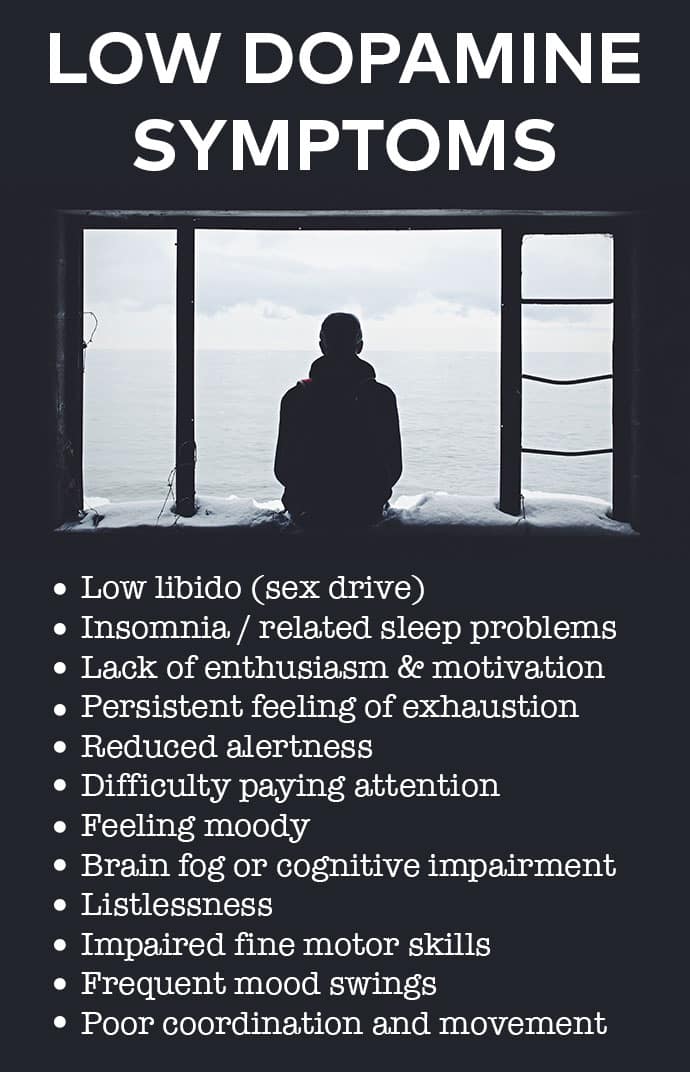Understanding Dopamine in the Brain
If you’re interested in learning how to reset dopamine levels you need to understand what Dopamine is and it’s crucial function within the body.
Dopamine is an important neurotransmitter that plays a key role in motivation, focus, attention, learning, and feelings of pleasure and reward.
When dopamine levels are balanced, we tend to feel productive, motivated, and focused.
Dopamine helps regulate emotional responses, movement, mood, cognition, attention, working memory, and learning.
It’s released when we anticipate or experience something pleasurable, like eating, having sex, creative activities, or stimulating conversations, reinforcing behaviors important for survival.
Imbalances in dopamine signaling have been linked to conditions like Parkinson’s disease, ADHD, addiction, depression, compulsive behaviors, and more.
Making lifestyle changes to maintain balanced dopamine levels can minimize adverse symptoms.
Signs Your Dopamine Levels Are Out of Balance
Some common signs that your dopamine levels may be too high or too low include:
- Lack of motivation and feelings of apathy, anhedonia or inability to experience pleasure. This often manifests as having no desire to engage in formerly enjoyable activities like hobbies or social interactions.
- Difficulty focusing, prioritizing tasks, or concentrating on work. You may constantly feel distracted, scattered, and unfocused.
- Fatigue, low energy, lack of drive. You have no vitality even with adequate sleep.
- Mood swings, irritability, feelings of unease. Your moods are erratic and difficult to self-regulate.
- Impulsivity and risky behaviors. You give into cravings for stimulation and pleasure without considering negative consequences.
- Anxiety, nervousness, inner restlessness. You feel fidgety and on edge frequently.
- Sleep disruptions such as insomnia or hypersomnia.
- Compulsive habits around food, gambling, gaming, shopping or pornography. You obsessively chase dopamine spikes.
- Physical symptoms like headaches, stomach issues, muscle tension or pain, back pain.
- Cognitive rigidity and addictive self-soothing habits. You rely on routines and habits to cope.
Factors That Deplete Dopamine Balance in the Brain
There are many lifestyle factors that can throw off dopamine signaling over time and deplete reserves:
- Chronic stress – The prolonged activation of the stress response floods the brain continuously with cortisol and adrenaline, depleting dopamine stores.
- Poor gut health – An unhealthy microbiome hampers the production of dopamine and the enzymes needed to synthesize it.
- Blood sugar imbalances – Insulin resistance and blood sugar spikes mute dopamine receptors.
- Nutrient deficiencies – Lack of amino acids, iron, folate, zinc and antioxidants impedes dopamine production.
- Lack of sunlight – Sunlight exposure boosts vitamin D which facilitates tyrosine converting into dopamine.
- Sedentary lifestyle – Physical movement triggers dopamine release while inactivity suppresses it.
- Overstimulation – Constant digital media, gaming, porn, gambling or substance use overwhelms receptors.
- Aging – Dopamine receptors and cell production decline naturally as we get older.
- Traumatic brain injury – Injuries to the brain disrupt dopamine networks needed for motivation.
Lifestyle Changes to Restore Dopamine Levels
Making certain lifestyle changes helps reset your dopamine levels back into a healthy balance.
This comprehensive approach helps replenish dopamine from all angles.
Get enough high-quality sleep every night.
Turn off screens 1 hour before bed.
Keep your room cool and dark, avoid caffeine in the late afternoon.
Try to go to sleep and wake up at consistent times to regulate circadian rhythms.
Healthy sleep is vital for dopamine synthesis and balanced hormone levels.
Exercise regularly with a focus on cardio and strength training which both boost dopamine immediately and over time by increasing receptor sites.
Aim for 30-60 minutes daily of heart-pumping physical activity. Weight training is also very beneficial for dopamine production.
Spend time outdoors in natural sunlight without sunglasses every morning. Sunlight exposure of at least 15 minutes helps regulate dopamine-boosting vitamin D.
Go for walks, have your coffee outside, or use a sunrise lamp.
Follow a gut-healing, dopamine-friendly, anti-inflammatory diet.
Minimize refined carbs and sugar which trigger spikes and crashes.
Focus on high quality proteins, probiotic foods like kefir and kimchi, prebiotic fiber sources such as garlic, onion, asparagus and apples, and lots of antioxidant-rich fruits and vegetables for vital phytonutrients.
Ensure adequate iron, amino acids, zinc and magnesium which aid dopamine synthesis.
Stay hydrated with electrolyte-enriched fluids.
Give your brain a break from dopamine-depleting overstimulating digital entertainment and social media.
Unplug and take screen breaks to give receptors a rest.
Read books, have real conversations, enjoy hobbies, play board games with friends or family.
Let your mind wander and be creative.
Practice daily stress-relieving techniques like breath-work, yoga, mindfulness, meditation, inspirational reading or journaling, or spending time in nature.
Chronic stress is kryptonite for balanced dopamine levels so actively counteract it by cultivating calm throughout your day.
Make relaxation a priority, not a luxury. Say no to overwhelm.
Supplement if helpful under professional guidance. Tyrosine, mucuna, curcumin, adaptogenic herbs, and probiotics may aid dopamine production. Always consult your doctor.
Avoid recreational drugs, limit caffeine and minimize alcohol intake which can disrupt delicate dopamine signaling and desensitize receptors.
Reset Your Dopamine Levels After Addiction
Addiction hijacks the brain’s dopamine reward pathway.
Addictive substances like alcohol, nicotine, opioids, and other drugs flood the brain with abnormally high levels of dopamine, creating an intense high and euphoria.
Over time, the brain adapts by making less dopamine and becoming less sensitive to it.
This leads to tolerance, requiring more of the substance to get the same high.
When use stops, people suffer dopamine depletion causing withdrawal symptoms like depression, fatigue, insomnia, or anxiety as their brain struggles to re-adjust.
Resetting dopamine after excessive drug, alcohol, sex or gambling addictions requires retraining your brain.
Strategies for restoring dopamine signaling after addiction include:
- Completely detoxing from all addictive substances and behaviors with a tapered weaning-off period to avoid severe withdrawal symptoms. This may require an inpatient medical detox program.
- Beginning dopamine repair and marshaling your self-discipline once withdrawal subsides. Dopamine levels will be extremely low making tasks requiring motivation very difficult. Start small doing activities you used to enjoy.
- Providing nourishing amino acids like l-tyrosine or l-phenylalanine supplements to aid dopamine synthesis under medical guidance.
- Increasing binding sites and dopamine receptors via aerobic exercise. Interval training 2-3 times a week works well.
- Allowing 2 years for full dopamine receptor recovery. This lengthy process requires commitment to recovery self-care skills and support communities to avoid relapse triggers during the extended post acute withdrawal phase.
Regulating dopamine naturally after addiction is challenging but very possible through clean living, brain-nourishing nutrition, physical training, mindfulness practices and social support.
The brain can bounce back with diligent practice of positive habits rewarding enough to motivate new healthy behaviors.
Seeking Professional Help
If lifestyle changes aren’t providing enough relief from dopamine deficiency symptoms like lack of motivation, focus issues, low mood, or addictions, consider consulting your doctor or mental health professional.
Underlying causes like hormone imbalances, inflammation, GI issues, chronic infections, autoimmunity, brain injuries and nutrient deficiencies can sabotage dopamine function.
Doctors can check your thyroid, iron levels, vitamin D, cortisol, fasting glucose and food sensitivities.
A mental health practitioner can assess for thought patterns, limiting beliefs or trauma contributing to dopamine dysregulation. Blood, stool, organic acid or fingernail tests can offer clues as well.
Based on test findings and symptom evaluation, they may recommend dopamine-supporting amino acids, herbs, nootropics or medications like Wellbutrin if appropriate alongside lifestyle measures.
Cognitive behavioral therapy (CBT) can also help change habits rewiring dopamine pathways.
Explore functional medicine for a root cause, whole-body approach rather than just temporarily managing individual symptoms.
Identify and resolve underlying drivers perpetuating suboptimal dopamine signaling.
Usually multi-faceted treatment works best guided by testing.
Ways to Stimulate More Dopamine Fast & Naturally
Alongside a brain-supporting lifestyle foundation emphasizing restorative sleep, nutritious food, physical movement and stress resilience, you can also stimulate daily dopamine hits with these activities:
- Listen to uplifting, energetic music – Music profoundly impacts dopamine circuits. Create feel-good playlists that inspire movement.Sing, dance and let loose.
- Engage your senses creatively – Crafting, painting, sculpting, playing instruments, flower arranging. Working with your hands, colors, textures in new ways sparks novelty-driven dopamine
- Learn new skills – Actively challenge your brain by learning new things: languages, arts, puzzles, instruments or games. Mastering novel skills releases dopamine.
- Laugh – Nothing beats laughter’s dopamine-enhancing, mood-boosting magic. Seek humor daily with funny videos, silly friends, humor books or improv classes if needed.
- Be playful – Jump on a trampoline, swing, go tubing downriver, zipline or play laser tag. Play taps into youthful joy and dopamine rushes. Schedule play, it’s brain-protective.
- Try new flavors – Discover exotic cuisine, spices, fermented foods and new recipes to excite your taste buds. Food adventure unlocks dopamine.
- Meet new people – Conversations with intriguing people provide hits of dopamine. Learn their stories. Set up a weekly coffee date.
- Explore passions – Delve into what sparks motivation and joy: hiking, volunteering, concerts, culture or causes. Follow your innate interests for fulfillment.
The key on how to reset dopamine levels is choosing healthy dopamine boosting activities tailored to your unique interests verses instant gratification dopamine traps like gambling, porn, reckless thrill-seeking or substance abuse which desensitize receptors.
How Long Does it Take to Reset Dopamine Levels?
Resetting your dopamine levels requires being patient and consistent with brain-nourishing lifestyle habits.
Prioritize restorative sleep, a dopamine-optimized diet low in inflammatory triggers, regular vigorous exercise outdoors, stress relief practices, recreational dopamine boosters, and supportive healthcare.
With compassionate troubleshooting tailored to your genes, environment and symptoms, you can rebalance dopamine for improved moods, motivation and focus. Then you’ll have the energy to show up as your best self and thrive pursuing passions aligned with your soul’s purpose.
Balanced dopamine levels will help you feel motivated, resilient, inspired and fully alive.
Related Posts
- Klonopin High: The Dangers, Effects, and Symptoms
Klonopin, the brand name for the drug clonazepam, is a medication used to treat panic…
- Foods That Increase Serotonin Levels
Natural Ways to Increase Serotonin Levels for Improved Mental Health – Serotonin Foods & Activities…
- 6 Top Signs of Teen Drug Use
Teen drug use and overdoses have been on a steady rise since 1999. Although drug…











